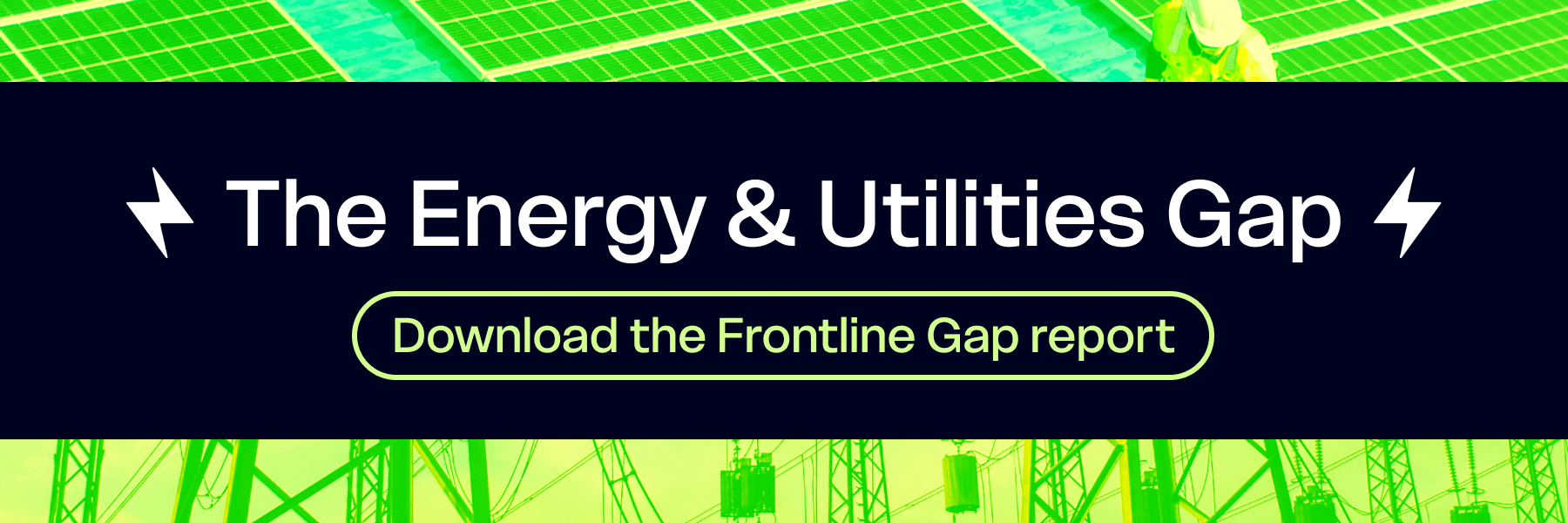Learn from 5,000+ comms leaders on exec buy-in, engagement, and the ROI puzzle.
How To Power Up Frontline Employee Engagement in Energy and Utilities

Barbara Booras
Senior Customer Community Manager at Workvivo
November 3 2025

Frontline energy and utilities workers keep the infrastructure that powers daily life running safely, reliably, and efficiently. But even though their work fuels everything from our homes to businesses and services, many frontline workers in this industry still feel overlooked and underappreciated.
For our recent Frontline Gap report, we surveyed over 7,500 frontline workers, including 1,087 in energy and utilities, to understand how these employees are really feeling. We discovered that while there are positive trends in terms of engagement, recognition, and connection, frontline workers in this industry still feel undervalued compared to their desk-based colleagues.
Want to learn more? Download the full Energy and Utilities Frontline Gap report for in-depth insights and actionable tips, and read on for our key takeaways.
Engagement is high, but microcultures could create factions
Some good news: frontline workers in energy and utilities show some of the highest levels of engagement with company culture compared to other industries. More than half (57%) say their company culture feels real to them – a notable improvement on the global average of 42% – while 51% report that they feel strongly connected to their company’s mission and values, the highest across industries by far.
But while engagement with company culture is high, this cohort is also more prone to forming microcultures. Almost two-thirds (61%) of respondents feel their team has its own workplace culture distinct from the broader company culture, and a whopping 75% say they feel more connected to their team than to the rest of the company – again, the highest results across any industry
This has pros and cons. While team camaraderie and loyalty are great, the formation of microcultures can deepen the fracture between frontline and desk workers. Instead, organizations should promote both team and cross-functional connections by creating shared virtual spaces that transcend role and location, enabling frontline workers to connect with colleagues from anywhere.
Despite frequent recognition, frontline energy and utilities workers still feel overlooked
Recognition is more common in energy and utilities than other industries, with an impressive 45% saying they’re “frequently” recognized for their work and only 13% reporting they rarely or never receive recognition.
Despite this, however, energy and utilities workers still struggle with feeling undervalued, particularly compared to their desk-based colleagues. Over half (59%) believe their company cares more about office or desk workers than them, with 58% feeling that they have a bigger impact but aren’t recognized for it. What’s more, favoritism or bias is the number-one factor negatively affecting this cohort’s sense of belonging at work.
Luckily, the recognition gap is easy to close, and doing so could have a huge impact. In fact, more than half of frontline energy and utilities workers would prefer public praise to a bonus, making this the only industry where recognition overtakes compensation.
4 out of 5 frontline energy and utilities workers use personal messaging apps for work
Our research revealed that the majority of frontline employees across industries (69%) use personal messaging apps for work purposes, but this rises to 80% in energy and utilities.
Like most frontline workers, employees in energy and utilities feel frustrated by the company communications technology they have to use, with almost a third (32%) saying their employer’s app or scheduling tool makes them feel micromanaged.
This doesn’t just expose your business to risks like security and compliance issues, information silos, and misalignment; it can also lead to employee disengagement. Over half (57%) of frontline energy and utilities workers believe that the communication tools their company uses feel designed for desk workers instead of them, exacerbating the divide between frontline and office workers and making frontline employees feel like an afterthought (again).
Keep frontline workers amped up
There’s a lot of positive sentiment among frontline workers in the energy and utilities industry – but there’s still significant room for improvement.
Going forward, organizations need to build on this solid foundation to further develop these workers’ sense of engagement and connection, ensuring they feel supported and valued by the wider business and not just their own team.
Want to learn more? Download your copy of the Energy and Utilities Frontline Gap report now.
